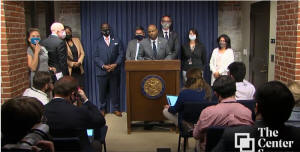|
Early Tuesday morning, Illinois House Speaker Emanuel “Chris”
Welch, D-Hillside, said discussions on an energy bill that could
have subsidies for nuclear power were close, but not quite
there.
“Well that’s a complex issue,” Welch said. “We were close and
we’re going to continue to work on it and hopefully we’ll have
something soon.
State Rep. David Welter, R-Morris, said Tuesday that Welch
should call members back “within the next week” to appease
nuclear generation companies that have threatened to close.
“This is not a game of brinksmanship that we want to play on
this topic,” Welter said. “If we do not pass something here
within the next week or two I don’t believe that [Exelon] is
going to go past their operation dates that they have put out
there.”
Last August, Exelon Generation announced it planned to retire
nuclear generation stations in Byron in September 2021 and the
Dresden plan in Welter’s district in November 2021. The utility
claims it faces revenue shortfalls in the hundreds of millions
of dollars because of declining energy prices.
Senate President Don Harmon, D-Oak Park, Tuesday said he’s ready
to return to vote on an agreed bill when it’s ready.
“I’m informed that an agreement has been reached between the
governor and Exelon on a proposal that would save jobs, which
has been our goal all along,” Harmon said in a statement Tuesday
afternoon while the Senate was in session. “That’s why we
support the governor in these talks.”
“The Senate remained in session with the hope of voting on an
agreement today,” Harmon said. “We stand ready to return to the
Capitol when the governor’s plan is ready for action.”
How much taxpayers would be on the hook isn't yet known, but it
could be hundreds of millions of dollars.
Welter couldn’t say how much taxpayers would be on the hook.
“It depends on the term, the length of it,” Welter said. “We
just need to see that language. I hear it's going back-and-forth
right now.”
In his first public appearance in nearly two weeks Tuesday, Gov.
J.B. Pritzker also couldn’t say what level of subsidies there’d
be, but promised the utility is not writing the bill.
“But ultimately they’ve got to be some part of the conversation
because we want to keep those jobs and we want to keep those
plants open and that’s been a firm principle of mine, I’ve said
that from the beginning, while we’re also working toward a
clean-energy future,” Pritzker said.
Pritzker said he maintains his goal of ending coal-generated
power in Illinois within the next 14 years.
“Such a bailout would ostensibly save the 1,200+ jobs at the
Dresden and Byron nuclear plants – at a cost to ratepayers of
~$500,000 per job,” said David Kraft of the group Nuclear Energy
Information Service. “Theoretically, that’s progress. The 2016
bailout ‘saved’ nuclear plants jobs at the tune of $1.5 million
per job.”

|
|




